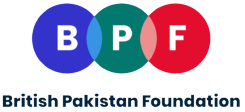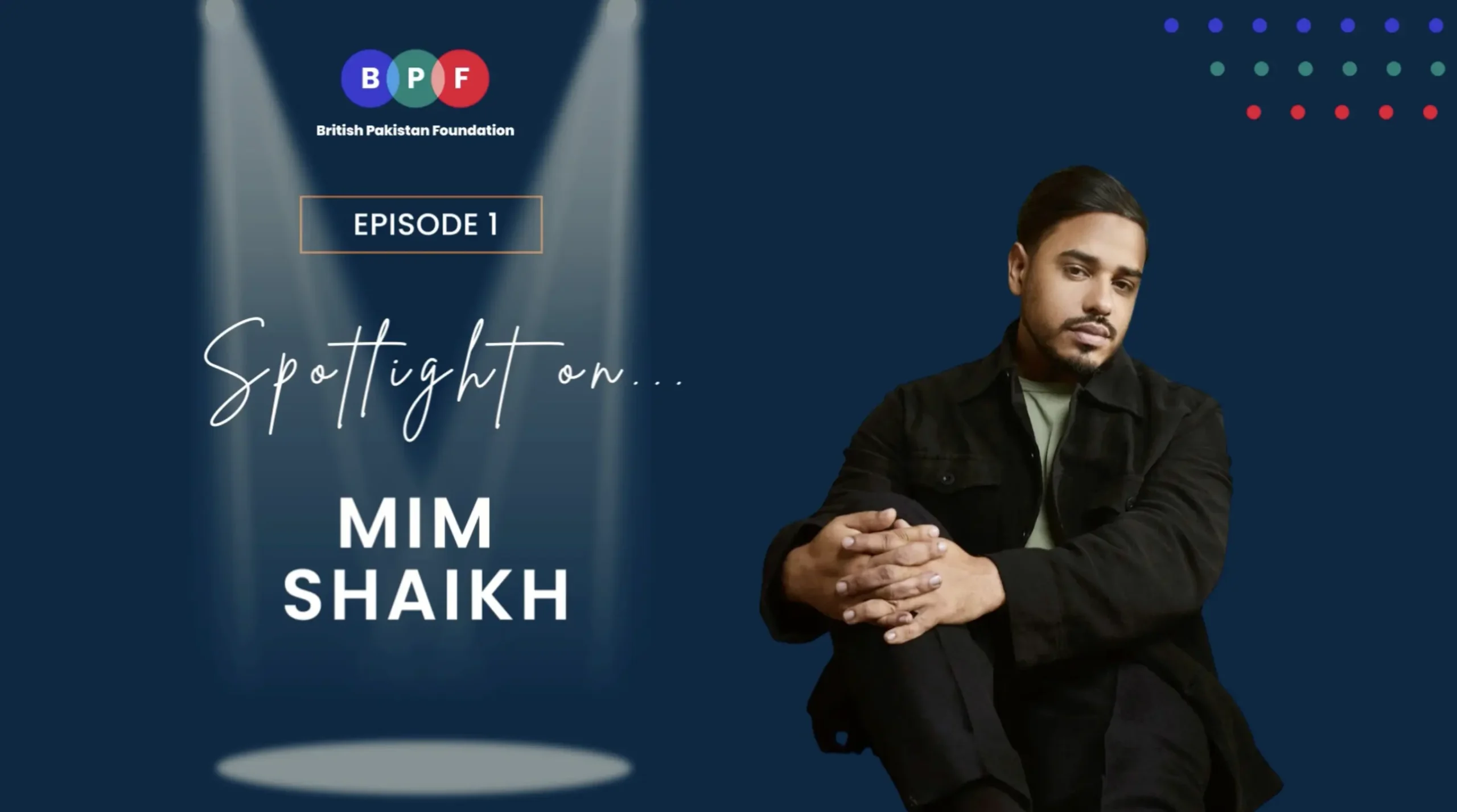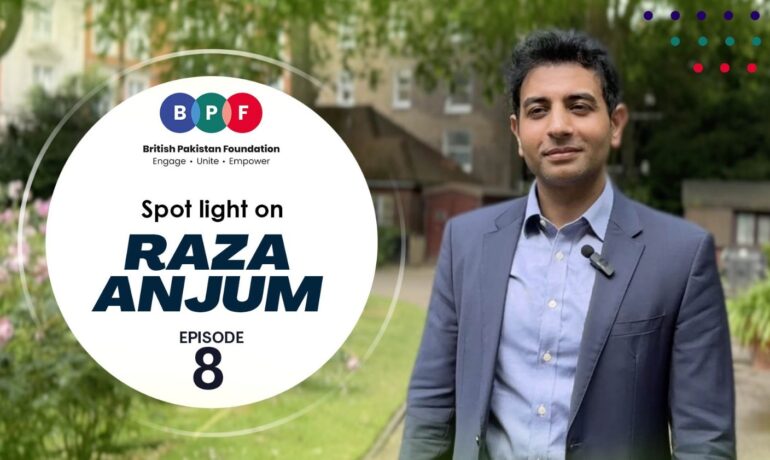Spotlight on Mim Sheikh
Actor, Broadcaster and Spoken-Word Poet, Mim Shaikh is a multi-faceted talent and with his career spanning so many paths, you are sure to recognise him from one of them. Hailing from South London, Mim has hosted his own radio shows on BBC Asian Network and BBC Radio 1Xtra, as well as starring in over 12 film and television productions, with the most recent being a big screen global phenomenon celebrating British Pakistani culture, What’s Love Got To Do With It? We put the spotlight on Mim to find out more about his journey and why his identity is so important in the media industry…
What inspired you to become an actor?
I think I’ve realized over time, it’s actually my mum who’s been my biggest inspiration to be an actor. And that’s not to sound like a sweet son, but it’s actually the truth. She would have Bollywood films on repeat in my childhood. I remember watching Hum Aapke Hai Kaun about 17 times! I remember watching Raja Hindustani, Mr. India, like every classic Bollywood film you can think of. My mum is like the biggest fanatic of Bollywood cinema. We develop our psyche in our childhood – whatever we go through as children, sometimes it can have a massive impact on our adult life. It developed into my passion and desire to work in the arts industry. So yeah, I’d say the thing that inspired me the most is probably, my mum.
How did your family react to your decision to work in the media, especially acting?
When I told them I wanted to work in media, It didn’t surprise them. It made sense because from a young age in school, media would be the subject that I was excelling in. So it was the subject that I would get full marks in and at parents evening, the teachers would say, he is really good at this. My uncle who has passed away now, he came to one parent’s evening and they gave me an award for making a magazine. He said, this boy is gonna do something quite remarkable – just watch. I think it was just this level of creativity and vision that maybe other children didn’t have. My grandma passed away when I was 25. She was in the hospital when I got my first film role, in an independent feature film. When I told her that I got the film she said, you’ve been an actor since you were five years old, copying people, mimicking everyone! So that was kind of reassurance for me because this woman who’s raised me pretty much, already knew this would be my career path so it felt like the right thing to do. So there have been no negative reactions from my family. When my family watched my first film, I asked my Uncle, what were your thoughts on the film? He said, it was good and it wasn’t a pornographic movie or anything, and I was like, what?! Why is that your reaction? But it’s because the, the scenes in the film might not have been, conventionally what they’re used to seeing.
How did you know where to begin your career path?
That’s a good question. I didn’t, to be fair, I just went with what felt right. So when it came to study at university, I decided to choose Broadcast Journalism since I wanted to go down the media path. I didn’t want to do conventional journalism at the time because I had a feeling that print journalism was dying and no one is reading magazines and newspapers. I’m so glad I made that decision, as everything is now digitalised. Everyone is on their phones, digesting content via a website, online articles, social media etc. I just knew I wanted to go down that route of broadcast media and then I fell in love with radio. I just wanted to become a radio presenter. I was focused on that for five to six years with shows on BBC Asian Network, BBC Radio 1Xtra, until I realised I’m not learning anything anymore and decided to move towards film and television. I didn’t have a master plan, I just got myself an agent and went with what felt right. I just wanted to make sure whatever it is I was doing, I was learning something new that will push me to the next stage. After radio, that led me to making a documentary for BBC Three, traveling the world in Pilgrimage: The Road To Istanbul. Then What’s Love Got To Do With It? happened.
What challenges did you face when first starting out and how did you venture into poetry, presenting and acting respectively?
The biggest challenge was trying to get big roles or big opportunities, as I feel like everything that I was doing early on was very small scale. So I got a small role in a TV series called King Gary on BBC, which was, about a local group of working class builders from South London. I got another small opportunity to play a character in Doctors, for example, where I’m in one episode for one scene. So there were very small opportunities and I felt like that was challenging in the beginning because you can’t really make a lot of money. That’s why radio was really helpful. Also, no one’s really going to watch something like that and be like, wow, he was great in that – let me cast him in this next project, as the exposure of those projects was not so huge.
I got into poetry when I was feeling really bad when my grandma passed away and I felt all of these things, but I didn’t know how to express them. Especially with hyper-masculinity in our society, it’s like we don’t really teach men how to express how they’re feeling. So, I started writing and it felt good for me and it made me feel like I was getting stuff off my chest, sharing it with the world. And that I think really helped me cope with bereavement because I have never been through that before and it was a new experience. It helped me a lot. I understood where I was coming from, I understood how I felt, which was very helpful for me to not go lash out or make erratic decisions.
Presenting, obviously came in with me wanting to be a Radio Presenter, and then came acting. I got cast in a short film, called Daytimer, which was one of the first opportunities where I realized, wow you can actually do this thing that comes so naturally to me and get paid for it. It became a professional career path and that was never explained to me before. Where I’m from, it isn’t the norm that you can do this and become successful. Riz Ahmed gave me that opportunity. Had I not had that experience, I wouldn’t have been able to understand that I fully deserve to be in this position just as much as everyone else. But I would have thought Asian people don’t do that. They’re not there, so let’s not go for it.
How would you define or describe your British Pakistani identity?
I’m British Pakistani, I’m South Asian and I’m a South Londoner. It’s as simple as that. That’s how I would describe it. Being British Pakistani means that I have the ability to kind of mesh between two cultures. I can be British because I’m born here. We can go for a Sunday roast, go and watch football and do British things like eat fish and chips. But then also at the same time, I can come to my house and my aunties can be cooking up the most amazing biryani and celebrate Eid. It’s like you have this ability to float between the two, whereas before I used to feel out of place, whereas now, I can naturally be here. I’m not compromising who I am. The same way that the Union Jack represents my heritage is the same way that the Pakistani flag, with a star and a crescent moon represents where I’m from as well. They’re both a part of my DNA and my existence as a British Pakistani.
What kind of challenges have you faced growing up being British Pakistani?
I think the main challenge from a career perspective is people having an assumption about you, creating some stereotypical image of what you are like, not really getting to know you and seeing you for who you are. That has probably been the biggest challenge. Sometimes people stereotypically assume that people from the South Asian diaspora are really good at business or they’re great accountants, or they’re great doctors for example – whereas what I do is very creatively driven. That has probably been the main challenge, which I find really frustrating. We’re not there yet I don’t think, but we need to be able to get to a place where people can just be given opportunities based on their talent and not where they’re from. That shouldn’t ever be a thought or a consideration, like it should just be based on the idea that is being presented to them. But obviously, finances come to play in that. Money is a big thing. Like will this be able to make us X amount of money? The biggest challenge is probably getting ideas off the ground because of people thinking you are a certain way that is not true.
Tell us more about your latest podcast, Ek Cup Chai and what is it you hope to achieve through it?
Ek Cup Chai is a show about crossing cultures, commissioned by the Independent, based in Pakistan who are part of the Independent newspaper. I pitched them the idea and they absolutely loved it. it’s a vehicle for South Asian talent, entrepreneurs and sports people to basically come and speak about their culture, identity, their heritage, their history and challenges that they faced in a very safe environment.
I feel at times in my career I was excluded from certain places, so rather than complaining about it and being bitter about it, I decided to just take the power in my own hands and be like, let’s just create a vehicle where we can try and be the place where I would love to be invited. It gives various talents the opportunity to promote their film, beasked certain questions because the vibe feels right. The whole purpose of the show is to get people on to talk about themselves, their culture, their heritage, their identity, whilst doing it in a calm, nice, warm environment – that is the main purpose of the show.
How was your experience working on a big production like What’s Love Got To Do With It?
From a filmmaking point of view and from being an actor that was the biggest project that I’ve been a part of right now in my career. I felt like wow, I’ve actually been given this amazing opportunity and I felt I belong in this space, as I felt like I wasn’t getting any opportunities up until that point. The whole experience was great, being able to work with people that you’ve seen on TV for a long time such as, Emma Thompson, Shabana Azmi. But also from a filmmaker’s perspective, observing Shekhar Kapoor directing, as well as seeing how the cameraman, the cinematographer operate. One day I want to be able to make my own film and be able to do something similar to what Jemima Khan has done. So far, it’s been one of the highlights, of my career and it’s being watched by people across the world right now.
What has been the most important project you have worked on so far?
It would have to be my documentary about me and my biological father, because I’d say that helped me understand where I come from and helped settle some of the demons that I had in my head about the paternal side of my upbringing. It also helped so many other people, from the messages that I got when it went out and that people were able to reconnect with their dad. So because it helped me and it helped other people at the same time – I have to say, that is probably the most important thing I have been a part of. When I was young I was very naive to the think, I just want to be on TV and radio because that’ll be cool and I’ll be famous and make a lot of money and all my problems will go away. That’s the reason I went into it, but when I got into it, I realised that what I do for a living is so important on a bigger level, that the role of TV has the ability to change people’s lives. It’s like you shared your story and connected with all of these human beings who are in the same position as you, but you would’ve never known that what you went through, someone else is also going through. That’s what I found remarkable about it.
What words of reassurance would you give to Pakistani parents whose children want to pursue a career in media?
Parents might be worried that it’s not going to work for their children and that it’s a very competitive and hard industry, and they’re right to feel that way because it is up and down. But to reassure them, I would say – would you rather have a happy daughter or a happy son who feels fulfilled in their job? Or would you prefer an unhappy son / daughter who hates what they do? And I’m sure nine times out of 10, the parent will turn around and say, I would prefer to have a happy son or daughter who feels fulfilled in their job. So that’s why you should let them go down that route and allow them to have career satisfaction. So I would just reassure them and although it will be difficult but in the long term, if they feel fulfilled and satisfied, then surely you’ve done your job as a parent correctly.
What advice would you give your younger self when it comes to your career?
Stop worrying! But there’s no point in giving that advice because I still worry to this day – I just think I’m a worrier. Just enjoy it man and take it all in. Create amazing relationships with people and try to remember all the amazing things so that you can capture memories and hold onto them forever.
Did you ever have a mentor or someone who really inspired you growing up or during your career who has helped guide/support you?
I’ve had so many. There’s not just been one, I’ve had countless amounts of people’s help. It upsets me sometimes that life makes you so busy and you don’t get to stay in touch as much as you should. And this is even a reminder for me to, reach out to these people and just drop them a message, which I do occasionally. I’ve had various people who have believed in me, helped me, assisted me, listened to me, told me, this is what I think you should do, go in this direction, do this, do that which I’ve been so thankful for. I try and do that with people who are trying to do something similar to what I’ve done, to make time and be that person. It’s hard sometimes when people don’t reach out to and ask you for help, because I don’t want to be that imposing person, as you should also just be able to do what you want. But if anyone ever asks me for assistance, help or guidance, I will always be there to help. You’ve got to be an individual who likes asking questions and finding answers. I’m indebted to my mentors and I remember all of them. I need to become better at staying in touch with them and just letting them know that I appreciate their presence.
You can watch Mim’s Ek Cup Chai podcast series on YouTube.
Interview by Fariha Sabir-Bajwa




